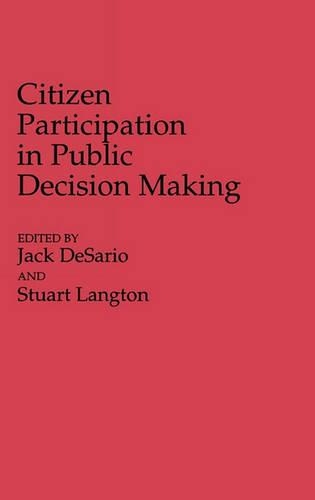
Citizen Participation in Public Decision Making
(Hardback)
Publishing Details
Citizen Participation in Public Decision Making
Bloomsbury Publishing PLC
Praeger Publishers Inc
13th January 1987
United States
Classifications
Tertiary Education
Non Fiction
323.0420973
Physical Properties
Hardback
249
Description
As services provided by government have expanded over the past several decades, so inevitably, has bureaucracy--especially the corps of professional administrators in charge of programs ranging from health care to the maintenance of efficient transportation networks. Under pressure from reform groups to promote public accountability by involving citizens in the decision-making process, government has begun to place private citizens on many important health, education, transportation, and environmental planning bodies. This study of citizen participation and technocracy, written by twelve prominent specialists, provides the first comprehensive theoretical and empirical analyses of these recent developments and their impact on formulating, directing, and implementing public policies.
Reviews
A collection of ten essays that examine and often advocate direct and meaningful citizen participation in public decision making. The book's common thread is the tension between technocratic and democratic approaches to complex issues.... Overhanging these essays is the current perception of economic scarcity, ' with its imperative to target resources, which tends to centralize power in the hands of experts and bureaucracies. Counterstrategies are weighed-e.g., using public advisors, opening up' administrative procedures, creating representative' citizen boards. Essays register both optimism and pessimism about citizen participation and balance prescriptive with descriptive treatment. Comprehensive bibliographies; footnotes. Upper-division and graduate students and general readers.-Choice
"A collection of ten essays that examine and often advocate direct and meaningful citizen participation in public decision making. The book's common thread is the tension between technocratic and democratic approaches to complex issues.... Overhanging these essays is the current perception of economic scarcity, ' with its imperative to target resources, which tends to centralize power in the hands of experts and bureaucracies. Counterstrategies are weighed-e.g., using public advisors, opening up' administrative procedures, creating representative' citizen boards. Essays register both optimism and pessimism about citizen participation and balance prescriptive with descriptive treatment. Comprehensive bibliographies; footnotes. Upper-division and graduate students and general readers."-Choice
